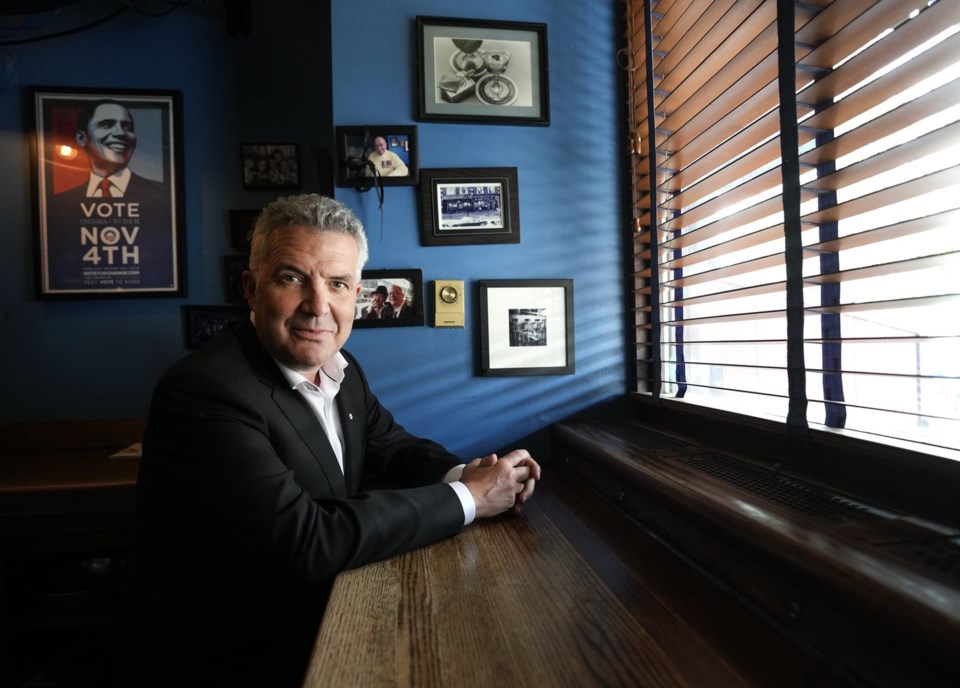TORONTO — Rick Mercer picks up the bottle of sparkling water he just ordered, puts on his glasses and inspects the label.
"Where's that from? We're not having that in the shot if it's American. Jeez," he says, glancing at the video camera with an impish smile.
It's a product of Italy, but he moves it out of the shot anyway.
"Are we rolling?"
We are. On this Tuesday afternoon in late spring, Mercer sits in a booth by the window at a Toronto restaurant. The sparkling water, his now-discarded reading glasses and some notes he doesn't reference are the only things in front of him as he promotes his new comedy tour, "Stand-Up for Canada," which gets underway in September.
The show's message, he says, meets the moment: one in which U.S. President Donald Trump has imposed punishing tariffs on Canada and threatened this country's sovereignty.
"That has permeated almost every aspect of our lives, but it actually hasn't impacted my act at all. I'm doing the same act," he says. "I decided a long time ago that everything I do was going to be celebrating the country."
Mercer believes people are looking for that now more than ever, given the animosity that's developed between Canada and the United States: a relationship that is in some ways foundational to our national self-image.
"If you want to have that conversation about what it means to someone to be Canadian, you've really got to dig because the first thing that nine out of 10 Canadians will do is they'll start talking about how we're different than Americans, which is no way to define yourself," he says.
"What's happening in the country now — people are standing in the middle of drugstores Googling what's a Canadian toothpaste, and they're reading labels in the ways that they've never read before, and their making choices about whether they'll eat a kiwi fruit — that's new. But I think it's always been there: Canadians, we're a proud country, there's no doubt about it."
Playing off of this cross-border kinship is part of how Mercer became a household name north of the 49th parallel.
His wildly popular segment "Talking to Americans" took off on CBC's "This Hour Has 22 Minutes" and spawned an hour-long comedy special in April 2001.
More than two million viewers tuned into the special to watch Mercer ask Americans leading questions about Canada based on ludicrous stereotypes. Would they consider a visit to our national igloo? What do they think of Canada's national dish, the beaver ball?
"It really was one joke over and over again, but it was a joke that Canadians really enjoyed," he says.
The execution of that joke relied on two things, Mercer says: Americans' ignorance about Canada and their goodwill towards Canadians.
"I was aware that by and large Americans knew nothing about Canada. But they did know we were the neighbours, and they wanted to be only generous and kind to the neighbours," he says.
"That has clearly changed somewhat. People are very suspicious of Canada. I think Americans are more suspicious of everyone, both inside their country, their neighbours, and then outside their country as well."
That Americans are looking more closely at Canada is one of many reasons the bit wouldn't work today, Mercer says. The list also includes the general mistrust in mainstream media and the likelihood that once-unsuspecting Americans might recognize him from online clips.
For his purposes, that's OK. It seems like it's time to look inward rather than measuring ourselves against others, he says: "In order for Canada to be good, Denmark doesn't have to be bad."
The temptation to focus on the giant underneath us is ever-present, but Mercer is practised at resisting it.
He left "Talking to Americans" behind when he launched his flagship TV show, "Rick Mercer Report," in 2004. Over the course of 15 seasons, he travelled across the country, poking fun at politicians along the way.
"When I was doing 'Mercer Report,' one of the big learning curves that writers who worked on the show had to deal with was that in our universe that we created, America didn't exist. Like, it really didn't. We were just like, 'we don't talk about that.'"
Americans got enough attention elsewhere, he says, so if the show talked about entertainment, it wouldn't be American entertainment. If it talked politics, it wouldn't be American politics.
Whether his September tour will take the same tack remains to be seen. It's early yet, he says, but he doesn't foresee dunking on the United States overmuch.
Tickets go on sale later this week, but he isn't due to hit the road until Sept. 11, performing 22 shows in 38 days alongside comedians Sophie Buddle, Mayce Galoni and Julie Kim.
This is Mercer's third standup tour. He's leaned into live performance since leaving TV behind in 2018. Last year, he toured in conversation with musician Jann Arden.
He also wrote two memoirs, "Talking to Canadians," about everything leading up to "Rick Mercer Report," and "The Road Years" about the time he spent on the show.
"If you're in my business, if you're creating TV shows, if you're doing one-man shows — which I used to do in my early 20s — if you're writing books, if you're writing scripts, it really helps if you love your subject matter. And my subject matter has always been my country," he says.
"And I'm not saying it's perfect, not by a long shot. It's just, that's someone else's lane. Right now it's all about celebrating."
This report by The Canadian Press was first published June 3, 2025.
Nicole Thompson, The Canadian Press



